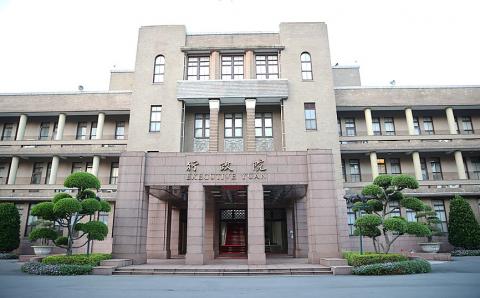The Cabinet is this week to publish guidelines governing a ban on the use of Chinese information technology (IT) products by central and local government offices, an Executive Yuan official who declined to be named said yesterday.
Entitled “Guidelines for Utilization of Mainland Area-Made Information Technology Products by Public Agencies” (各公務機關使用陸資產品處理原則), the executive order would apply broadly to any foreign-made product deemed to pose a security risk, the official said.
The guidelines cover mobile devices, security cameras and server components among others, and Chinese companies affected by the ban could include Huawei Technologies Co, Hangzhou Hikvision Digital Technology Co and ZTE Corp, the official said.

Photo: Liao Chen-huei, Taipei Times
The Executive Yuan believes it has the legal authority to impose the guidelines on local government offices, the official added.
Executive Yuan spokeswoman Kolas Yotaka said that the guidelines are nearly complete and they are to affect government offices and public employees, not private citizens or enterprises.
The Executive Yuan is nearly finished with drafting the order and Premier Su Tseng-chang (蘇貞昌) is expected to approve the guidelines in the coming days, when it becomes a publicly available document, she said.
In related news, industry sources said that many of the public and private buses use Huawei products to provide passengers with free Wi-Fi services.
Zhinan Bus Co, which operates in Taipei and New Taipei City, said that about 400 of its buses use Huawei products to provide riders with free Wi-Fi.
In New Taipei City, Zhinan buses have been using routers made by MikroTik in Latvia that are coupled with Huawei-made 4G network cards to provide Wi-Fi services.
Huawei network cards are costly, but offer superior stability and connection speed, while the Chinese company’s business agents had also been more helpful during installation, Zhinan said, adding that it has not received any customer complaints regarding information security.
Capital Bus Co general manager Lee Chien-wen (李建文) said his company tried to stick with Taiwanese cards, but had to purchase 20 Huawei-made cards after some of the Taiwanese products repeatedly broke down.
“We are a private business and we receive no public subsidies for purchases,” he said.
“The paperwork for those purchases are in order and our business follows the law scrupulously,” he said.
However, the use of Huawei components anywhere in the circuit of a hotspot device, Wi-Fi router or network base station could open data to backdoor exploits, former National Applied Science Laboratories vice president Lin Ying-dar (林盈達) said.
“Since most free Wi-Fi networks are not protected by passwords or encryption, the browsing data are vulnerable to sniffing or interception by hackers,” said Lin, who teaches computer science at National Chiao Tung University.
“In many airports around the world, public Wi-Fi is known to be intercepted by hackers, as well as government agencies,” he said. “My advice is to use it as little as possible, or surf through an encrypted VPN [virtual private network].”

Nipah virus infection is to be officially listed as a category 5 notifiable infectious disease in Taiwan in March, while clinical treatment guidelines are being formulated, the Centers for Disease Control (CDC) said yesterday. With Nipah infections being reported in other countries and considering its relatively high fatality rate, the centers on Jan. 16 announced that it would be listed as a notifiable infectious disease to bolster the nation’s systematic early warning system and increase public awareness, the CDC said. Bangladesh reported four fatal cases last year in separate districts, with three linked to raw date palm sap consumption, CDC Epidemic Intelligence

Two Taiwanese prosecutors were questioned by Chinese security personnel at their hotel during a trip to China’s Henan Province this month, the Mainland Affairs Council (MAC) said yesterday. The officers had personal information on the prosecutors, including “when they were assigned to their posts, their work locations and job titles,” MAC Deputy Minister and spokesman Liang Wen-chieh (梁文傑) said. On top of asking about their agencies and positions, the officers also questioned the prosecutors about the Cross-Strait Joint Crime-Fighting and Judicial Mutual Assistance Agreement, a pact that serves as the framework for Taiwan-China cooperation on combating crime and providing judicial assistance, Liang

Reports of Taiwanese going missing, being detained or interrogated, or having their personal liberties restricted in China increased about fourfold annually last year, the Mainland Affairs Council (MAC) said yesterday. Last year, 221 Taiwanese who traveled to China were reported missing, were detained and interrogated, or otherwise had their personal freedom restricted, up from 55 the previous year, the council said. Reopening group tours to China would be risky, as it would leave travelers with no way to seek help through official channels after Beijing shut down dialogue between the associations tasked with handling cross-strait tourism, the MAC said. Taipei’s Taiwan Strait Tourism

SHIFT: Taiwan is evolving from a transit stop into a tourist destination, with more international travelers willing to spend on tours, dining and cultural activities Taiwan rose three places in the World Tourism Barometer to 36th globally in 2024, with international tourism revenue of US$10.028 billion, the Tourism Administration said on Monday. The UN Tourism Organization publication said that its focus has switched from whether a country has returned to pre-COVID-19 levels of tourism to the amount spent by a tourist during an overseas trip. The nation last year welcomed 8.57 million international tourists, about 9 percent more than in 2024, with most tourists coming from Japan, South Korea, and Hong Kong and Macau, all of which accounted for at least 1 million tourists each. During the first